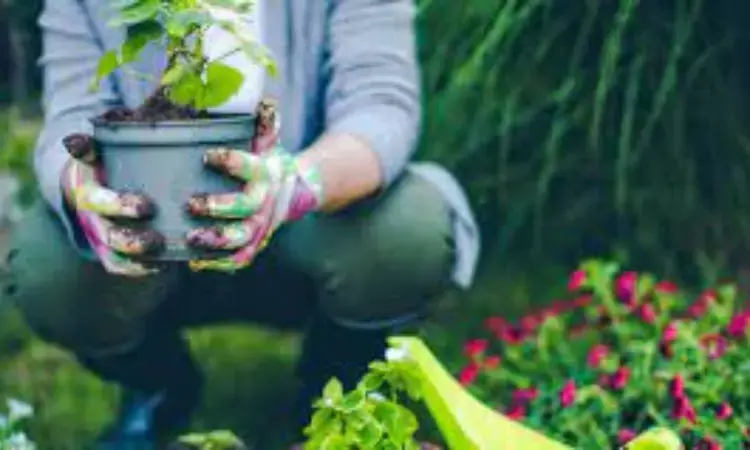- Home
- Medical news & Guidelines
- Anesthesiology
- Cardiology and CTVS
- Critical Care
- Dentistry
- Dermatology
- Diabetes and Endocrinology
- ENT
- Gastroenterology
- Medicine
- Nephrology
- Neurology
- Obstretics-Gynaecology
- Oncology
- Ophthalmology
- Orthopaedics
- Pediatrics-Neonatology
- Psychiatry
- Pulmonology
- Radiology
- Surgery
- Urology
- Laboratory Medicine
- Diet
- Nursing
- Paramedical
- Physiotherapy
- Health news
- Fact Check
- Bone Health Fact Check
- Brain Health Fact Check
- Cancer Related Fact Check
- Child Care Fact Check
- Dental and oral health fact check
- Diabetes and metabolic health fact check
- Diet and Nutrition Fact Check
- Eye and ENT Care Fact Check
- Fitness fact check
- Gut health fact check
- Heart health fact check
- Kidney health fact check
- Medical education fact check
- Men's health fact check
- Respiratory fact check
- Skin and hair care fact check
- Vaccine and Immunization fact check
- Women's health fact check
- AYUSH
- State News
- Andaman and Nicobar Islands
- Andhra Pradesh
- Arunachal Pradesh
- Assam
- Bihar
- Chandigarh
- Chattisgarh
- Dadra and Nagar Haveli
- Daman and Diu
- Delhi
- Goa
- Gujarat
- Haryana
- Himachal Pradesh
- Jammu & Kashmir
- Jharkhand
- Karnataka
- Kerala
- Ladakh
- Lakshadweep
- Madhya Pradesh
- Maharashtra
- Manipur
- Meghalaya
- Mizoram
- Nagaland
- Odisha
- Puducherry
- Punjab
- Rajasthan
- Sikkim
- Tamil Nadu
- Telangana
- Tripura
- Uttar Pradesh
- Uttrakhand
- West Bengal
- Medical Education
- Industry
Gardening linked to lowering stress, anxiety and depression

University of Florida scientists have found in a new research that gardening can cultivate better mental health and people may indeed reap mental health benefits from working with plants-even if they've never gardened before. Further gardening activities lowered stress, anxiety and depression in healthy women who attended twice-weekly gardening classes.
The study was published in the journal PLOS ONE.
"Past studies have shown that gardening can help improve the mental health of people who have existing medical conditions or challenges. Our study shows that healthy people can also experience a boost in mental wellbeing through gardening," said Charles Guy, principal investigator on the study and a professor emeritus in the UF/IFAS environmental horticulture department.
The study was co-authored by an interdisciplinary team of researchers with the environmental horticulture department, the UF College of Medicine, the UF Center for Arts in Medicine and the UF Wilmot Botanical Gardens, which also hosted all the study treatment sessions.
Thirty-two women between the ages of 26 and 49 completed the study. All were in good health, which for this experiment meant screening for factors such as chronic health conditions, tobacco use and drug abuse, and having been prescribed medications for anxiety or depression. Half of the participants were assigned to gardening sessions, while the other half were assigned to art-making sessions. Both groups met twice a week for a total eight times. The art group served as a point of comparison with the gardening group.
"Both gardening and art activities involve learning, planning, creativity and physical movement, and they are both used therapeutically in medical settings. This makes them more comparable, scientifically speaking, than, for example, gardening and bowling or gardening and reading," Guy explained.
In the gardening sessions, participants learned how to compare and sow seeds, transplant different kinds of plants, and harvest and taste edible plants. Those in the art making sessions learned techniques such as papermaking, printmaking, drawing and collage.
Participants completed a series of assessments measuring anxiety, depression, stress and mood. The researchers found that the gardening and art making groups experienced similar improvements in mental health over time, with gardeners reporting slightly less anxiety than art makers.
Given the relatively small number of participants and the length of the study, the researchers were still able to demonstrate evidence of what medical clinicians would call the dosage effects of gardening-that is, how much gardening someone has to do to see improvements in mental health.
"Larger-scale studies may reveal more about how gardening is correlated with changes in mental health," Guy explained. "We believe this research shows promise for mental wellbeing, plants in healthcare and in public health. It would be great to see other researchers use our work as a basis for those kinds of studies."
The idea of using gardening to promote better health and wellbeing-called therapeutic horticulture-has been around since the 19th century.
But why does being around plants make us feel good? The answer might be found in the important role of plants in human evolution and the rise of civilization, the study's authors explain. As a species, we may be innately attracted to plants because we depend on them for food, shelter and other means of our survival.
Whatever the deeper reasons might be, many of the study participants left the experiment with a newly discovered passion, the researchers noted.
"At the end of the experiment, many of the participants were saying not just how much they enjoyed the sessions but also how they planned to keep gardening,'" Guy said.
Reference:
Raymond Odeh, Elizabeth R. M. Diehl, Sara Jo Nixon,C. Craig Tisher, Dylan Klempner, Jill K. Sonke, Thomas A. Colquhoun, Qian Li, Maria Espinosa, Dianela Perdomo, Kaylee Rosario, Hannah Terzi, Charles L. Guy Published: July 6, 2022 https://doi.org/10.1371/journal.pone.0269248
Dr Kamal Kant Kohli-MBBS, DTCD- a chest specialist with more than 30 years of practice and a flair for writing clinical articles, Dr Kamal Kant Kohli joined Medical Dialogues as a Chief Editor of Medical News. Besides writing articles, as an editor, he proofreads and verifies all the medical content published on Medical Dialogues including those coming from journals, studies,medical conferences,guidelines etc. Email: drkohli@medicaldialogues.in. Contact no. 011-43720751


